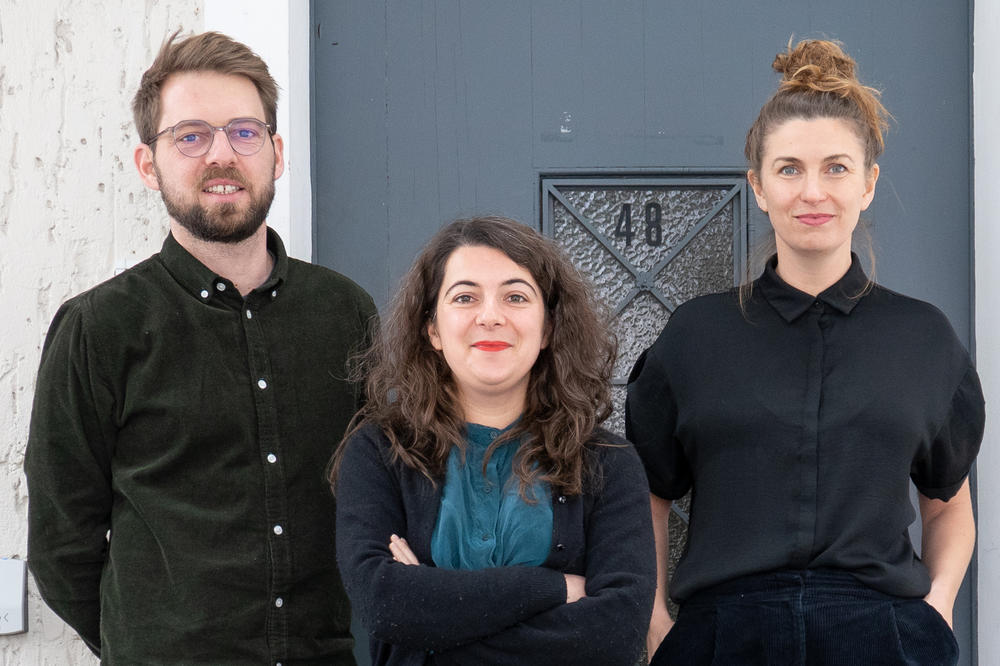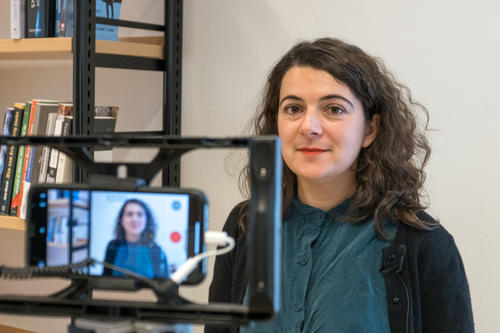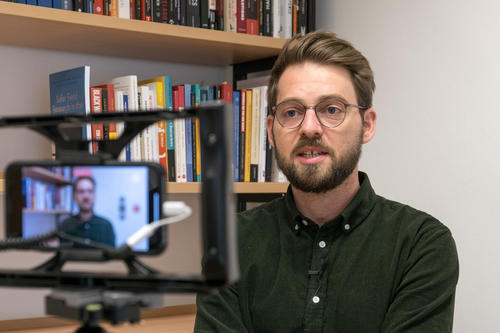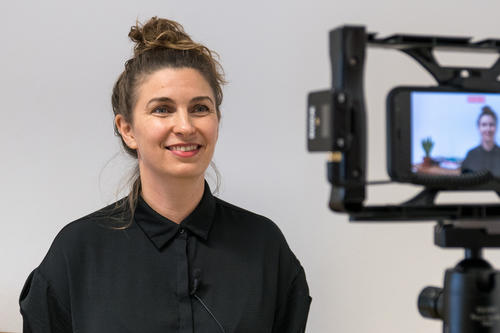Researching Flashpoints around the Globe
The INTERACT Center for Interdisciplinary Peace and Conflict Research at Freie Universität Berlin recently launched with three research groups
Mar 09, 2022
Jannis Grimm, Mariam Salehi, and Hannah Franzki are each leading a new research group at the INTERACT Center for Interdisciplinary Peace and Conflict Research, which was established at Freie Universität Berlin last November.
Image Credit: Marion Kuka
“We don’t just want to conduct research – we want to make a difference in the political sphere and contribute our findings to debates concerning ongoing conflicts,” says Mariam Salehi. She adds that this is why Berlin is the ideal location for the new center, as it is home to numerous political science institutes, political foundations, embassies, and nongovernmental organizations along with the German federal ministries.
Salehi is the head of one of three research groups at the INTERACT Center for Interdisciplinary Peace and Conflict Research, which was established at Freie Universität Berlin last November.
Back in 2019 the German Science and Humanities Council recommended a stronger focus on peace and conflict research in Germany. The members addressed issues such as establishing a better network both within the field and with other related disciplines. The Berlin Senate took a decisive step in allocating the funding for a research center that would be situated at Freie Universität Berlin.
This is where Hannah Franzki, Jannis Grimm, and Mariam Salehi will each lead a research group that will initially last three years. Just a few weeks ago, the three postdocs moved into the upper floor of a small villa with a garden at Altensteinstraße 48 in Dahlem. The house where the Nobel Prize laureate in chemistry, Otto Hahn, once lived was previously home to the Berlin Graduate School Muslim Cultures and Societies, who have since moved to Hittorfstraße 18.
Committed to Applied Basic Research
The new offices have not yet been fully set up, and the Covid-19 pandemic has not made things any easier – but the team is already set to expand: “We’ve just posted three positions for research associates or doctoral candidates,” says Grimm. They are also planning on engaging with partners in Berlin, wider Germany, and the Global South, inviting guests, and giving conflict researchers at Freie Universität Berlin the opportunity to connect with the center.
They are hoping to focus on applied basic research: “We are aiming to identify violent conflicts all over the world, categorize them, and understand the processes behind them,” says Franzki. “Our best chance of achieving this is if we overcome disciplinary boundaries.” Peace and conflict research has typically been the preserve of political science and international relations departments. However, the INTERACT Center wants to incorporate approaches from sociology, computer science, law, and other disciplines.
That is why the center’s steering committee includes professors from different subjects such as Sven Chojnacki and Tobias Berger (political science), Heike Krieger (law), Swen Hutter (sociology), and Volker Roth (computer science). However, Franzki, Salehi, and Grimm will primarily hold teaching responsibilities at the Otto Suhr Institute of Political Science.
Violence Linked to a Former Colonial Power
The research groups have different focal points. Mariam Salehi leads the Transnational Conflicts research group, which aims to analyze political, social, economic, and legal interdependencies in transnational conflicts and the consequences they have for conflict regulation.
In her first book – which recently came out – she investigated the concept of transitional justice in Tunisia following the fall of the dictatorship in 2011. A Truth and Dignity Commission supported by international institutions scrutinized the regime’s crimes. “During my research, I came across the question of whether this manner of supposedly technocratic conflict resolution can actually carve out the space needed for emancipatory struggles,” says Salehi.
Some groups used the Truth and Dignity Commission to demonstrate that violence was not only perpetrated by the Tunisian regime, but also by its former colonial power – France – and international financial institutions. “We have to take a closer look at who exactly is producing the knowledge we receive on tyranny and conflicts, and by which means. This is because specific ideas about justice are formed during knowledge production.”
In her next project she wants to use other countries as case studies to examine the interaction between technocratic and emancipatory struggles for justice.
The Arab Spring – Non-Violent Despite Repression
The research group Radical Spaces is led by Jannis Julien Grimms. The Islamic studies and political science scholar received his doctorate from the Berlin Graduate School Muslim Cultures and Societies at Freie Universität Berlin. He has worked on projects in the Middle East and North Africa for institutions such as the German Institute for International and Security Affairs and the Friedrich Ebert Foundation.
He is particularly interested in the fact that despite being faced with massive repression by the state, the protesters in the second wave of the Arab Spring in Algeria, Sudan, and Lebanon have remained peaceful. Radicalization has not been a feature of the conflict – instead, these social movements tend to express their radicalism in their commitment to non-violence. “Perhaps this is because people in these countries have already gone through painful civil wars, or maybe it has to do with the lessons learned during the Arab Spring initiated in 2011, or having a different political culture.”
Even in the wake of the Rabaa massacre in Cairo in 2013 – which Grimm researched in his latest book – when state security forces brutally cracked down on a camp of Morsi supporters, powerful symbolic processes prevailed against the potential radicalization of the protesters, even when they were under fire. “This resulted in a collective identity that took the form of a pro-democratic, anti-military movement that ultimately rejected violence as a political means,” explains Grimm.
Since then, similar processes have been seen across the world in places like Hong Kong and Chile. “Radicalism can also mean remaining radically non-violent, even when you are subject to repression.” That is why Grimm is currently researching how exactly interaction dynamics between authorities and protest movements promote or constrain political violence.
Companies on Trial
Hannah Franzki, a researcher in politics and law, investigates conflicts in terms of economic activities undertaken by transnational corporations within the framework of the “Blurring Boundaries” research group. Her current project addresses the boundary between what are considered legitimate forms of economic activity and impermissible ones according to international law since the onset of the colonial era.
Through her work, Franzki wants to support political actors who do not have resources for research available to them. However, she doesn’t want to instruct them on how they should proceed, but instead organize and produce critical knowledge that aids such actors in clarifying their own positions.
As an example, she points to her research on the trials in Argentina that have taken place since the early 2000s to address the complicity of major corporations in human rights violations during the military dictatorship in power from 1976 to 1983. Franzki analyzed the proceedings and made her research results available to the group of plaintiffs in the form of short memorandums.
“We Have Different Perspectives”
Franzki came to the conclusion that judicial proceedings are indeed a suitable means of refocusing attention on the process of coming to terms with the Argentinian dictatorship. However, they have not succeeded in demonstrating the actual power and influence such corporations have, as criminal law assumes that there is a clear distinction between the repressive state apparatus and the selective assistance proffered by economic actors. “Yet workers in the major factories in the countryside had the totally opposite experience,” says Franzki.
The three researchers are looking forward to being able to work independently with their own research groups in the future as well as conduct research as a team. “Jannis works a lot with discourse theory, Hannah has a critical and legal outlook, and processual sociology is my specialization,” says Salehi. “We have different perspectives, so we complement each other very well.”
This article originally appeared in German on January 13, 2022, in campus.leben, the online magazine of Freie Universität Berlin.




